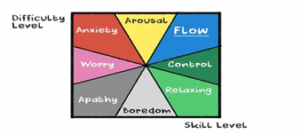Have you ever been so engrossed in an activity that you lose track of time, and everything else seems to fade away? This state of complete immersion and heightened focus is known as the ‘flow state’ or ‘being in the zone’. For elite athletes and coaches, understanding and achieving this state can be a game-changer.
The Science Behind the ‘Flow State’
Researchers at Drexel University have made significant strides in understanding the ‘flow state’ using neuroimaging technology. They’ve discovered that two key elements contribute to achieving this state: focused concentration and years of practice leading to a specialized brain network.
In a study involving 32 jazz guitarists, brain activity was recorded while they improvised. The findings were fascinating – experienced musicians reached a flow state more frequently and intensely. The left hemisphere of the brain, associated with music, showed increased activity during the flow state, while activity in the superior frontal gyri, linked to executive control, decreased.
The Power of Practice and Expertise
The study underscores the importance of building deep expertise in a discipline and learning to withdraw conscious control once that expertise is achieved. This is particularly relevant for elite athletes and coaches. Through concentrated practice, athletes can develop their skills to a level where they can effortlessly engage in their sport while maintaining optimal performance.
Beyond the Playing Field
The implications of these findings extend beyond personal achievement. Understanding and harnessing the power of the flow state can enhance productivity across various domains, including sports and business settings. Furthermore, integrating these principles into educational systems or professional environments could potentially improve overall well-being and satisfaction among individuals.
As research continues on this fascinating topic at the intersection of neuroscience and psychology, we eagerly anticipate further insights into how different regions of the brain interact during flow states, and how this knowledge can be applied to boost performance in various fields.
So, whether you’re an elite athlete aiming for the gold, a coach guiding a team, or an individual striving for personal growth, understanding and achieving the ‘flow state’ could be your secret weapon for success.
Here are some techniques that can help you achieve this state:
- Intrinsic Motivation: Approach your work from an angle that you love. It’s easier to reach a flow state when you’re tapped into intrinsic motivation. Remember – every single activity or pursuit of excellence has elements of things we do not like. BUT, you have the choice as to how you perceive it.
- Balance Challenge and Skill: Find a sweet spot between feeling challenged while still feeling like the task before you is achievable.

If skill level is LOW and difficulty/challenge is HIGH – we experience anxiety and worry. If skill level is HIGH and difficulty/challenge is LOW – we experience boredom and apathy If skill level and difficulty/challenge are in balance and high we have a higher probability of achievei a Flow state. - Create a Conducive Environment: Create a situation that is conducive to focus. Reserve time each day for engaged and purposeful work. Eliminate digital distractions by shutting down or silencing your phone, closing your browser and email, and turning off the TV.
- Clarity of Goals and Immediate Feedback: Having clear goals and receiving immediate feedback can help you stay focused and motivated.
- Intense, Focused Concentration on a Specific Task: The more you can focus on a specific task, the more likely you are to enter a flow state. You will be required to give yourself time to enter into the flow state.
- Sense of Personal Control and Agency Over the Task: Feeling in control of the task at hand can help facilitate a flow state.
Remember, everyone gets into the flow in different ways, so it’s important to find what works best for you. Happy flowing!
References/Sources:
- Csikszentmihalyi, Mihaly. Flow: The Psychology of Optimal Experience. Harper & Row, 1990
- Achieve Flow State
